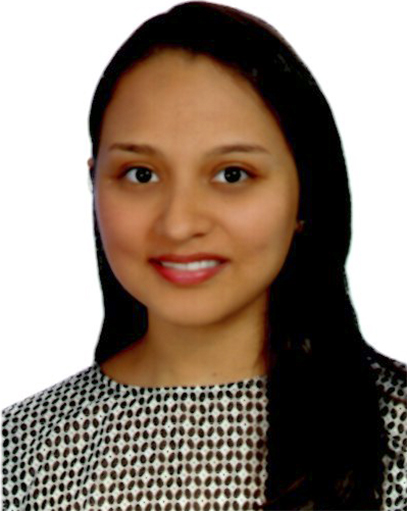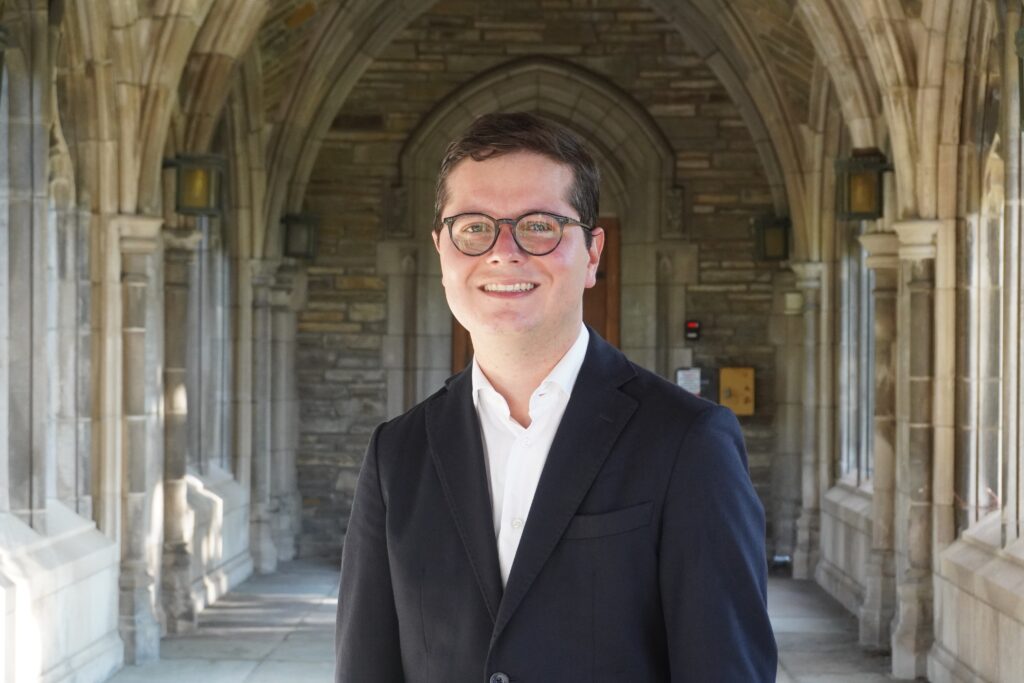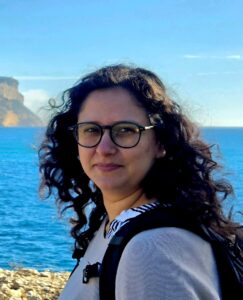This website uses cookies
We use cookies to ensure that we give you the best experience on our website. If you continue to use this site we will assume that you are happy with it.

Maria Alejandra joined the JSD program at Cornell Law School in 2021. Maria is from Colombia and specializes in human rights and public international law. She obtained her LL.M with Distinction at the London School of Economics and Political Science (LSE) in 2020. She also holds an LLB and a BA in International Relations from Universidad del Norte (Colombia).
Before joining Cornell, Maria was an associate and practiced law at a law firm for three years. She held different research positions in which she conducted projects in human rights, transitional justice, peace, and post-conflict studies. Maria received the Young Researcher Fellowship from the Colombian Ministry of Science, Technology, and Innovation in 2017. During this fellowship, she explored the role of the land restitution jurisdiction on the evolution of property rights of internally displaced persons (IDPs) in Colombia. She is currently a member of a tight-knit foundation where she provides legal counsel to communities in northern rural Colombia.
Her current research explores the relationship between case law, human rights, and climate change. She seeks to unfold the hidden effects of climate litigation in the plight of climate change, especially how a human rights-based approach to climate litigation has reshaped climate NGOs’ behavior and their impact on the international arena.
Cornell Law School Graduate Fellowship (2021)
COLFUTURO’s Scholarship-Loan Program Beneficiary to study the LLM at the LSE (2019)
Silver Medal for Academic Excellence (BA in International Relations) (September 2016)
Silver Medal for Academic Excellence (LLB) Universidad del Norte (March 2016)
Latin America Scholarships: Undergraduate Students – Santander Universities Award. Exchange Program at Tecnologico de Monterrey, campus Monterrey, Mexico (Fall 2015)
First National Competition of Academic Writings in Honor of Professor Luis Alberto Gomez Araujo. First Place (May 2015)
International Law & Climate Change
International Human Rights Law
Public International Law
Transitional Justice
Peace & Conflict Studies

Mayar Darawsha is a J.S.D. candidate from Arrabah City, Israel. Before attending Cornell, Mayar obtained her LL.B. degree from Tel-Aviv University. During her LL.B. she worked as a teaching assistant with Professor Eliav Lieblich in Public International Law course for 4 consecutive terms. Mayar also worked as a corporate lawyer in Israel for two years at Herzog Fox & Ne’eman and Amit Pollak Matalon law firms. Mayar also served as an editor in the Cornell International Law Journal (ILJ). Mayar is fluent in Arabic, Hebrew, and English.
Mayar obtained two CALI Awards in Public International Law and Political Obligation courses.
Laws of Armed Conflict and the Use of Force
International Human Rights Law
Political Theory
Muna Ndulo (Chair)
Jens David Ohlin
Email: md968@cornell.edu
Phone: (607) 262-4515

Santiago García Jaramillo is a J.S.D. candidate from Colombia. His research focuses on the intersection between Moral-Political Philosophy and Constitutional Theory. Santiago obtained his LL.M. from Yale University (2022); a LL.B. from Pontificia Universidad Javeriana (Colombia, 2013), and a specialization degree in public law from the Universidad Externado de Colombia (2016). He was a law clerk at the Chamber of Justice Alejandro Linares-Cantillo at the Colombian Constitutional Court, from 2015 to 2021.
Santiago has been a Professor of Constitutional Law at Pontificia Universidad Javeriana (Colombia) at undergraduate and graduate level since 2013; He has also been a professor of Constitutional Theory at Universidad de la Sabana (Bogotá, Colombia) and Universidad del Magdalena (Santa Marta, Colombia). He was a visiting research scholar at Cornell University (Spring, 2018 and 2019). Santiago served on the editorial board of the Yale International Law Journal (2021), and has served as peer reviewer on several journals on constitutional law and philosophy of law.
“An Uneasy Argument Against the Bullfights Ban (and other Cultural Expression Involving Animals) in Colombia” 58 Cornell Int’l L.J. F. [1-11], (2025).
“Constitutionalism, Old Dilemmas, New Insights” (Assistant Editor with Alejandro Linares-Cantillo and Camilo Valdivieso-León), Oxford University Press, (2021).
“The Colombian Tale of Two Legal Revolutions” (co-author with Daniel Currea Moncada), 53 Cornell International Law Journal Online, 1 (2020).
“Judicial Review of Presidential Re- Election Amendments in Colombia” (Co-author, with Samuel Issacharoff and Vicente Benítez-Rojas) Analysis Decisions C-1040 of 2005 and C-141 of 2010, for Max Planck Encyclopedia of Public International Law [MPEPIL], Oxford International Public Law, (2020).
“Democratizing the Doctrine of Unconstitutional Constitutional Amendments: The Puzzle of Amending the Judiciary Branch” (co-author with Catalina Torres-Artunduaga) 14 (1) ICL Journal, 1, (2020).
“Colombian Constitutionalism: Challenging Judicial Supremacy through Pluralism”, 2 Int’l Comp., Policy & Ethics L. Rev. 317 (2019).
“Transforming the legislative: a pending task of Brazilian and Colombian constitutionalism”. (co-author with Camilo Valdivieso León) 5 Revista de Investigações Constitucionais, 43 (2018).
“Constitutional Replacement Theory: From Keeping the Supremacy and Integrity of the Constitution, to the Annihilation of the Legislative Power to Amend the Constitution” (co-author with Francisco Gnecco-Estrada), Pontificia Universidad Javeriana, 133 Vniversitas, 59 (2016).
Email: sg2268@cornell.edu
Phone: (631) 703-9031
Website: https://www.santiagogarciaj.com

Upasana Singh is a J.S.D. candidate at the Cornell Law School. Her research examines the institutionalization of restorative justice in the American criminal justice system, focusing on responses by state agencies once the harm is done. She also studies implementation methods to uncover how RJ related reforms are translated into lasting institutional practices. She is also working as a research assistant with Dr. Kaushik Basu, Carl Marks Professor of International Studies at Cornell University. She holds an LL.M. from Cornell Law School with a focus on conflict resolution and restorative justice. She serves on the review board of the Indian Law Institute Law Review. She is also a Reppy Fellow with the Reppy Institute for Peace and Conflict Studies.
Prior to this, she served as an Assistant Professor of Law in India and practiced as an advocate in the Supreme Court of India and the High Court of Delhi.
Upasana is also a certified mediator, holding credentials from the London School of Mediation, UK, and the High Court of Delhi, India. She is the founder of Accords International, an organization committed to shaping the next generation of mediators and restorative justice facilitators.
LL.M. (dual specialization in Human Rights & Criminal Law), Indian Law Institute, New Delhi.
LL.B., Campus Law Centre, Faculty of Law, University of Delhi.
B.A. (Hons.) in History, Kirori Mal College, University of Delhi.
Cornell Graduate Legal Studies Law Fellowship (2025-26).
Reppy Institute Graduate Fellowship (2025-26).
Cornell Graduate Legal Studies Law Fellowship (2024-25).
Fellowship for Outstanding Work in Mediation Policy, Global Policy Insights.
Award for Distinguished Service in Social Work, Sewa Samarpan Samiti, India.
Professor Jessica Eaglin (Chair)
Professor John H. Blume
Professor Valerie Hans
Criminal law and procedure
Juvenile Justice
Victimology
Restorative justice
ADR and alternatives to criminal legal system
Criminal Law, Public Policy, and Governance.
All India Bar Council
Delhi Bar Council
Supreme Court Bar Association, India
Email: us58@cornell.edu
LinkedIn- https://www.linkedin.com/in/upasasingh2490/

Ayesha Umana-Dajud is a doctoral candidate in Science of Law (J.S.D.) at Cornell University, where several institutes, including the Reppy Institute for Peace and Conflict Studies recognized her with research fellowships. Her dissertation, titled ‘The Crime of Genocide in International Criminal Law: A Story of Exclusion of Political Identities’, reflects her engagement with critical legal studies and international criminal law. Her academic journey began in Colombia, where she obtained a Bachelor of Law (LL.B.) from the National University, and a Graduate Degrees in Procedural Law and Criminal Law, before earning her LL.M. from Cornell University. Ayesha’s professional experience spans roles at The Office of Public Counsel for the Victims (OPCV) of the International Criminal Court in The Netherlands, at the Special Jurisdiction of Peace – JEP created by the 2016 Peace Agreements with the FARC-EP guerrilla in Colombia, and legal research positions for the Women & Justice Collection of the Legal Information Institute (LII) and The Death Penalty Center in the U.S. After the Peace Agreements signature, Ayesha volunteered in the FARC-EP reintegration settlements to teach alternative mechanism of conflict resolution and took part of missions to report the implementation needs of the Peace Agreements in rural communities. She also has trained Afro-Descendant leaders in the Pacific rainforest in Human Rights protection mechanisms, led a process of formalization of land ownership of farmers in the Andes, was the lead council in a land restitution process between an Hydroelectric and forced displaced farmers, and worked in previous consultation processes with Indigenous communities in the Línea Negra. Recently, she contributed to strategic litigation at the Inter-American Court of Human Rights on the advisory opinion on “Climate Change emergency and Human Rights” (2023) and drafted a report on women on death row, which triggered a joint communication from three UN Special Rapporteurs and two Working Groups to the Tanzanian government.
Muna Ndulo (chair)
Sandra Babcock
Elizabeth Brundige
International Criminal Law
Human Rights
Transitional Justice
International Humanitarian Law
Decolonizing Studies
Email: yu29@cornell.edu
LinkedIn : Ayesha Umaña Dajud

Yiang Zhu is a J.S.D. candidate from Shanghai, China. His research focuses on evictions within Chinese communities in the U.S., aiming to uncover how social norms influence the dynamic between landlords and tenants in lease disputes.
Yiang earned his LL.B. from Shanghai Jiao Tong University in 2023 and his LL.M. from Cornell Law School in 2024. During his LL.B., he served as a research assistant on empirical studies of private lending cases and civil litigation rates. At Cornell, Yiang serves as the Eisenberg Research Fellow specializing in empirical legal studies. He received CALI Awards in Contracts and Legal Writing courses and delivered the 2024 Law School Convocation speech.
Yun-chien Chang (Chair)
Property Law
Law and Society
Law and Economics
Empirical Legal Studies
Email: yz2962@cornell.edu
Phone: (607) 262-7564

Kuan-Ting Chen is a J.S.D. student at Cornell Law School from Kaohsiung, Taiwan. He also holds an LL.M. from Cornell Law School. His research focuses on the openness of legal reasoning in private law, exploring why and how private law reasoning should incorporate insights from foreign disciplines and foreign legal systems. Prior to joining Cornell, Kuan-Ting earned his LL.B. and LL.M. from National Taiwan University and was admitted to the Ph.D. program at National Chengchi University in 2022. He worked as a research assistant at Academia Sinica, Taiwan’s premier research institution, where he published several journal articles on topics such as the legal normativity, comparative law, and legal reasoning. During this period, he also co-authored two amicus curiae briefs submitted to the Taiwan Constitutional Court, one of which was cited in a Taiwan Constitutional Court’s judgment. At Cornell, he received CALI Awards in comparative private law.
Kuan-Ting Chen. (2025 accepted). A Rawlsian Critic on Stability Problem of Public Reason: Same-Sex Marriage Debates in Taiwan as an Example, In East meets West: Justice, Law, And Politics’: The Theme of IVRJ 2023, edited by Makoto Usami & Hidehiko Adachi. Stuttgart, Germany: Franz Steiner Verlag.
Kuan-Ting Chen and Yun-Chien Chang. (2024). How to Do Legal Interpretation with Comparative Law: A Methodological Reflection and Reconstruction. National Taiwan University Law Journal 53(2). (Top-tier journal indexed in TSSCI, in Chinese)
Kuan-Ting Chen. (2024). On the Privacy Discourse about Decriminalization of Adultery and the Interpretation No.791: Through the lens of James Q. Whitman’s Two Western Cultures of Privacy, The Constitutional Review 48(2): 243-279. (in Chinese)
Kuan-Ting Chen. (2024). No Compensation for Adultery? How and Why does Interpretation No.791 affect the Liability of Adultery, The Constitutional Review 47(4): 603-629. (in Chinese)
Yun-chien Chang and Kuan-Ting Chen. (2024). Empirical Legal Studies: Retrospect and Prospect, In Taiwan’s Legal Studies in Retrospect and a Review of Their Social Impacts 2001–2020 (I), edited by Chen-Jung Chan, Ching-Yi Liu & Wen-Tsong Chiou. pp.109–131. Taipei: Angle. (in Chinese)
Kuan-Ting Chen. (2023). The Tyranny of Efficiency: A Critical Review on the Methodological Thesis in Professor Yun-chien Chang’s Interpreting Private Law: A Social Scientific Approach, Academia Sinica Law Journal 32: 277-312. (Top-tier journal indexed in TSSCI, in Chinese)
Kuan-Ting Chen. (2022). Out of the Legal Thinking? Debating Cost-Benefit Analysis in lieu of Proportionality Principle, In Jurisprudential Imagination: Festschrift for Hon. Yeong-Chin Su, Vol.4: pp. 441–459. Taipei, Taiwan: Angle. (in Chinese)
Kuan-Ting Chen. (2020). The Absence of the Mental State in the Theory of Legal Normativity: A Reflection on Hart’s and Raz’s Theories, Academia Sinica Law Journal 27: 345-406. (Top-tier journal indexed in TSSCI, in Chinese)
Co-author, Brief of Empirical Legal Studies Research Center, Institutum Iurisprudentiae, Academia Sinica as Amicus Curiae to the Taiwan Constitutional Court (2024) (Case No. 111-Hsien-Min-904052) (in Chinese).
Co-author, Brief of Empirical Legal Studies Research Center, Institutum Iurisprudentiae, Academia Sinica as Amicus Curiae to the Taiwan Constitutional Court (2023) (Case No. Hui-Tai-9433) (in Chinese).
Email: kc2283@cornell.edu

Michelle du Plessis joined Cornell Law School’s J.S.D. program in 2025. Her research examines how international commercial law and conflict of laws frameworks (choice of law and jurisdiction) interact with decentralized autonomous organizations (DAOs) and smart contracts.
Michelle earned her LL.M. at Cornell in 2024 as a Fulbright Scholar, receiving multiple CALI Awards and the Harry G. Henn Memorial Prize. She previously completed B.Com Law and LL.B. degrees at the University of Pretoria, South Africa, was an exchange scholar at Leiden University, in the Netherlands, and interned at the Hague Conference on Private International Law (HCCH). At Cornell, she served as a General Editor of the Cornell International Law Journal.
Before returning to academia, Michelle practiced at White & Case LLP in Johannesburg and New York, advising private equity sponsors, lenders, and corporates on cross-border corporate and debt-finance transactions. Earlier, she was an Academic Associate in the University of Pretoria’s Private Law Department for the delict and property law courses, and co-authored peer-reviewed publications on equality law and legal education. She is an admitted Attorney of the High Court of South Africa and has passed the New York State Bar Exam (admission pending).
Professor James Grimmelmann (Chair)
Email: md2243@cornell.edu
LinkedIn: https://www.linkedin.com/in/m-du-plessis/
We use cookies to ensure that we give you the best experience on our website. If you continue to use this site we will assume that you are happy with it.